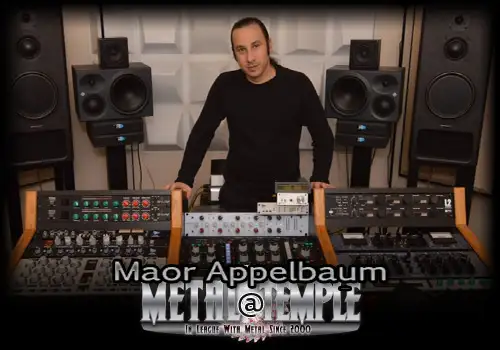Maor Appelbaum
•
March 31, 2015

The mastering process is basically putting the final touches on the project. You have the recording which is where you actually record the instruments. You have the mixing stage where you blend the instruments. Next is the mastering process where you polish that mix. This is where you add the final touches to the sound to get what the client [artist] wants. This can include toning the overall sound of the music, adjusting volumes of the songs as well as the music's overall sound, and making sure the music is ready for distribution. The main focus is how well the tracks flow together when completing the mastering process. The master engineer is the fresh and objective listener with control over the material. The mastering process is the buffer between the original recording and the release of the product.
Actually, most of my clients are people I enjoy working with. Some of these are big names, while others are local or international artists releasing their music independently. Its always about the relationships between the musicians, the people behind the music, and people's relationship to the music. Sometimes I work directly with the clients, and sometimes its with the producer, mixer, management, or record label. Of the bands I have worked with included Sepultura, Cynic, Fate's Warning, and Yngwie Malmstein.
There is a technological part, and there is an aesthetic part. The artistic part is a combination of the aesthetic and technical aspects. If you know the genre, that's always good. Metal is a big genre, and it has many sub-genres. Every sub-genre has its own aesthetic, and some genres crossover to share some aesthetics. It's very helpful to know where those elements appear. It's important to know the direction you want to go, and what will work for a particular recording. It's a mix of technological ability as well as artistic ability plus knowing how to blend them to achieve the desired sounds with the gear available. You also have to be an excellent listener. It's your job to take the music to the next level. The most important thing is to be able to to listen to the clients needs, and deliver the desired products with the equipment available.
Some artists hear an album and like the sound they hear. They want to work with the person who made the album. Other times, they are after a sound a producer is notorious for making. Others want to work with a producer due to their people skills and the communication. They may read the name on the album or meet the person who does mastering at a show. Bands can find someone to master their music through interviews, label recommendations, or by a friend who knows the producer.
I am a fan of music, and metal is one of them. Metal people are very knowledgeable about their genre. Not just about their metal and their band, but about the entire genre. They know the bands in their genre. They know what gear everyone uses and the sounds the gear makes. They are aware of who the people who produce, mix, and master the music are. Today, with the internet its much easier to find information on album production and credits. Metal fans are also very into the music, and they support a lot of it.
Music is all about feelings, and how you connection to those feelings. It's about how people connect with those feelings. You may work with a great musician who is not a great person, or a great person who is not a great musician. This can be any combination of the above. Or sometimes you can work with a great musician who is also a great person. I don't think a genre dictates what will be good or bad. The genre only determines how the music is produced aesthetically, and how the fans follow it. It's the people and the project that determine the work that has to be done. There can be a problem or issue that needs a solution, but releasing the final product is always gratifying. Metal is a great genre, and it has a lot of styles in it. Metal fans have to remember that music is an art that costs time and money. Artists love what they do, but if fans do not invest money in the artists they won't be around for long. Fans need to remember that.
I like mastering music, and I have been doing it for many years. I work with clients from around the world. Mastering music takes a lot of time and energy, but it's very satisfying. It's not a genre that makes the experience good or bad, but the people involved in it.
It really depends on the project. When albums do not need revisions the mastering gets done faster. When revisions are needed, it depends on how many revisions are needed. There is no specific guidelines as to how long it will take to the finish the mastering process.
It's changing because new technology makes it possible to do mastering for less money. More bands can afford to invest in mastering today. Back in the day the process took longer and it cost more money due to the formats available. You have got to have the experience to understand how be efficient and bring the depth into the process. Understanding how to move the aesthetics of the music forward has not changed. What has changed is the technology and formats available to get the job done. This is good as most budgets are a lot less than they used to be. Bands can decide what to spend. Bands must be disciplined to save their money, and all bands can support mastering and recording if they save diligently. People have to invest their money in their art if they love what they do. Fans need to buy CDs and go to shows. Bands need financial support. Not doing that is not supporting the scene you claim to be part of. Not many bands stay long in today's world. If they are important enough to you as a fan, invest to keep them here.
Some schools do offer some mastering classes. What I recommend is listening to a lot of music. Hear how it effects people the way it does. In heavy metal it's important to listen to a lot of classic rock and early metal. That influenced where metal has gone today. It's important to be a fresh and objective listener to the music. You have to be an outsider, because from inside you cannot bring new perspectives to the sound. Staying outside the art is vital to helping the band get the best sound possible. Putting the time into learning the profession can help you get really good. Like a musical instrument, you must put in the time and effort to be really good, which can to lead to becoming very successful. You have to try and see if you like it. School can provide tools, but the experience of doing it and the exposure to music and the profession will improve your skills.
It was great doing this interview! Thank you very much!
More results...





















